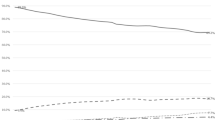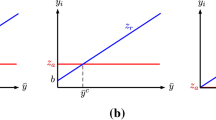Abstract
Social scientists and media commentators have expressed concern that Western countries are becoming “two-thirds societies” in which two-thirds enjoy the benefits of affluence, while one-third are locked into poverty or near-poverty. This paper, based on economic panel data, tests the two-thirds society hypothesis in the case of (West) Germany 1984–89. The main finding is that poverty (defined as receiving less than half of average household income) is mostly short term and that nothing like one-third are locked into poverty. On the other hand, far more people than had previously been thought are at risk of poverty. In 1984–89 only 3% were poor every year but about 25% were poor in at least one year. Germany appears to be a 75-15-10 society: 75% not poor, 15% occasionally poor but with generally adequate incomes, and 10% frequently poor or near-poor with incomes that may be considered inadequate. Analysis is based on the German Socio-Economic Panel Study (SOEP) and relates to the 8,000 people who were interviewed each year from 1984 to 1989.
Similar content being viewed by others
References
Alwin, D. C., and A. M. Hauser: 1975, ‘The decomposition of effects in path analysis’, American Sociological Review 40, pp. 37–47.
Bäcker, G.: 1985, ‘Ausgrenzung und Verarmung als Ergebnis von Politik und Ideologie des Neokonservatismus’, Soziale Sicherheit, Jg. 34 (5), pp. 129–137.
Bäcker, G.: 1987, ‘Sozialhife — Helfen zum Lebensunterhalt — Daten und Trends zur “Neuen Armut”’, Soziale Sicherheit, Jg. 36 (6), pp. 179–185.
Balsen, W., H. Nakeilski, K. Rösler and R. Winkel: 1984, Die neue Armut: Ausgrenzung von Arbeitslosen aus der Arbeitslosenunterstützung (University Press, Köln).
Bane, M. J., D. T. Ellwood: 1986, ‘Slipping into and out of poverty: the dynamics of spells’, Journal of Human Resources 21, pp. 1–23.
Berghman, J., H. J. Dirven, A. Huurne, and R. Muffels: 1990, Report on the Dutch Feasibility Study on a European Household Panel (Tilburg University Institute for Social Research, Tilburg).
Bethusy-Huc, V., V. Gräfin, and N. Bechman: 1989, ‘Neue Armut und neue soziale Frage’, Sozialer Fortschritt, 38 (5/6), pp. 121–124.
Buhmann, B., L. Rainwater, G. Schmaus, and T. M. Smeeding: 1988, ‘Equivalence scales, well-being, inequality, and poverty: sensitivity estimates across ten countries using the Luxemburg Income Study (LIS) database’, The Review of Income and Wealth 34, pp. 115–142.
Burkhauser, R. V., G. Duncan, R. Hauser, and R. Bernsten: 1990, ‘Economic burdens of marital disruption: a comparison of the U.S. and Germany’, The Review of Income and Wealth 36, pp. 319–334.
Burkhauser, R. V.: 1989, ‘Die amerikanische Antwort auf das veränderte Erscheinungsbild der Armut’, in Döring, D., Hauser, R. (Hg), Politische Kultur und Sozialpolitik. Ein Vergleich der Vereinigten Staaten und der Bundesrepublik Deutschland unter besonderer Berücksichitgung des Armutsproblems (Suhrkamp, Frankfurt), pp. 93–116.
Döring, D., W. Hanesch, and E-U. Huster (eds.): 1990, Armut im Wohlstand (Suhrkamp, Frankfurt).
Döring, D., and R. Hauser (eds.): 1989, Politische Kultur und Sozialpolitik. Ein Vergleich der Vereinigten Staaten und der Bundesrepublik Deutschland unter besonderer Berücksichitgung des Armutsproblems (Suhrkamp/Frankfurt).
Duncan, G. J. (ed.): 1984, Years of Poverty. Years of Plenty. The Changing Economic Fortunes of American Workers and Families (Institute for Social Research, Ann Arbor).
Duncan, G. J.et al.: 1990, ‘Poverty and social assistance dynamics in eight countries’, Conference on Poverty and Public Policy, Paris (Jan.).
Duncan, G. J., T. Smeeding, and W. Rodgoers: 1991, ‘W(h)ither the middle class?’ Levy Institute Conference on Income Inequality, Bard College (June 18–20).
Geissler, H.: 1976, Die Neue Soziale Frage (Herder, Freiburg).
Glatzer, W., P. Klein, and S. Leibfried: 1990, ‘Was heisst heute Armut and Existenzminimum’, Der Buurger im Staat 40, pp. 218–225.
Glotz, P.: 1984, Die Arbeit der Zuspitzung (Deutsche Verlag Anstalt, Berlin).
Habich, R., and T. Riede: 1989, ‘Satisfaction in West Germany 1978–1988 — no general dip but more inequality’, in Veenhoven, R. (ed.), Did the Crisis Really Hurt? Effects of the 1980–1982 Recession on Satisfaction, Mental Health and Mortality (University Press, Rotterdam), pp. 94–107.
Hagenaars, A. J. M.: 1986, The Perception of Poverty (North Holland, Amsterdam).
Hauser, R.: 1984, ‘Entwicklungstendenzen der Armut in der Bundesrepublik Deutschland’, in Döring D., Hauser R. (eds.) Politische Kultur und Sozialpolitik. Ein Vergleich der Vereinigten Staaten und der Bundesrepublik Deutschland unter besonderer Berücksichitgung des Armutsproblems (Suhrkmap, Frankfurt), pp. 117–146.
Hauser, R., and P. Semrau: 1989, ‘Trends in poverty and low income in the Federal Republic of Germany’, Working Paper, No. 306, Sonderforschungsbereich 3 (Universität Frankfurt).
Headey, B. W., R. Habich, and P. Krause: 1990, ‘The duration and extent of poverty — is Germany a Two-Thirds-Society?’, Working Papers (WZB, Berlin).
Heinze, R. G.et al. 1981, ‘Armut und Arbeitsmarkt: zum Zusammenhang von Klassenlagen und Verarmungsrisisken im Sozialstaat’, Zeitschrift für Soziologie 3, pp. 219–243.
Heinze, R. G.et al.: 1983, ‘Armut — nur ein Restproblem des Sozialistaats?’, Zeitschrift für Soziologie 2, pp. 157–168.
Henkel, H. A.: 1985, ‘“Neue Armut” hierzuland? nein danke! eine eher unwissenschaftliche Betrachtung’, Soziale Sicherheit 34, 7, pp. 201–204.
Leibfried, S., and F. Tennstedt (eds.): 1985, Politik der Armut und die Spaltung des Sozialstaats (Suhrkamp, Frankfurt).
Lompe, K. (ed.): 1987a, Die Realität der neuen Armut. Analysen der Beziehungen zwischen Arbeitslosigkeit und Armut in einer Problemregion (University Press, Regensburg).
Lompe, K.: 1987b, Sozialstaat und Krise. Bundesrepublikanische Politikmuster der 70er und 80er Jahre (Suhrkamp, Frankfurt).
Muhr, G.: 1984, ‘“Neue Armut” — Ursachen und Auswege. Zugang zur Arbeitslosenversicherung erleichtern’, Soziale Sicherheit 33 (8/9), pp. 225–228.
Pindyck, R. S., and D. L. Rubinfeld: 1991, Econometric Models and Economic Forecasts (McGraw-Hill, New York).
Rainwater, L.: 1974, Inequality and Justice (Basic Books, New York).
Rendtel, U.: 1990, ‘Teilnahmebereitschaft in Panelstudien: zwischen Beeinflußung, Vertrauen und sozialer Selektion’, Kölner Zeitschrift für Soziologie und Sozialpsychologie 42 (2), pp. 280–299.
Townswend, P.: 1979, Poverty in the United Kingdom. A Survey of Household Resources and Standards of Living (Penguin, Harmondsworth).
Van Praag, B. M. S., A. J. Hagenaars, and H. van Weerden: 1982, ‘Poverty in Europe’, Review of Income and Wealth 28, pp. 245–259.
Author information
Authors and Affiliations
Rights and permissions
About this article
Cite this article
Headey, B., Krause, P. & Habich, R. Long and short term poverty: Is Germany a two-thirds society?. Soc Indic Res 31, 1–25 (1994). https://doi.org/10.1007/BF01086511
Accepted:
Issue Date:
DOI: https://doi.org/10.1007/BF01086511




